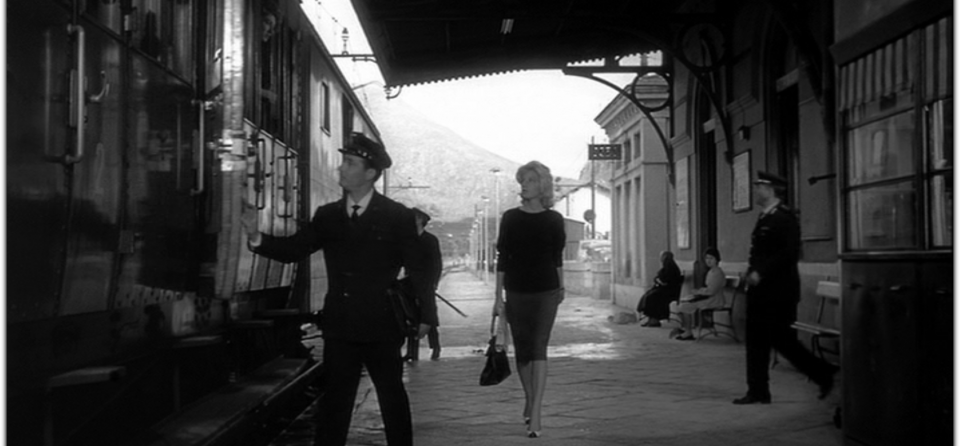With the runaway success, and unstoppable buzz of 50 Shades of Grey, I rented “The Night Porter” to revisit another sadomasochistic romance. Liliani Cavani’s 1974 film is very controversial, even today.
It’s set in 1957 Vienna where Max, a hotel night porter, and Lucia, a conductor’s wife, inadvertently meet again for the first time since WWII. Back then he was an SS officer and she was a teenager. He plucked her out of a crowd of prisoners and began to torture/rape her. She developed feelings for him, maybe what you’d classify as Stockholm Syndrome, and didn’t hesitate to resume their sadomasochistic relationship.
Max works at night. He says he feels his shame in the light. Lucia means light. She’s the only thing that brings him joy. Their fortunes have reversed after the war. Max, Dirk Bogarde, was a SS officer, now a lowly hotel clerk, in the middle of his war crimes trial. He has already killed one witness who could’ve testified against him. Lucia, Charlotte Rampling, is now a posh conductor’s wife. She is the only other witness to his crimes. He could easily kill her, but his feelings get the better of him.

Lucia, in a child-like dress chosen for her by Max, in a flashback during her time in the concentration camp.

She is now married to a orchestra conductor. Beautiful, fitted camel hair coat, upturned collar, pearls, very befitting her new station in life.
At one point Max chains Lucia in his room so his peers (other former SS officers) can’t take her away when he’s at work. One of them, Hans, confronts Lucia and tells her that she should cooperate with them so they can help Max. She doesn’t trust him and says she’s chained because Max doesn’t want them to take her. He laughs and says that a chain wouldn’t stop them if they wanted to. This is true. The real chain keeping them together is their shared sickness, and longing for the past.

In this infamous flashback scene, Lucia serenades the officers with Marlene Dietrich's "Wenn Ich Mir Was Wünschen Dürfte." The hat, gloves, mens pants and suspenders worn with Rampling overt sexuality and confidence continue to inspire designers.

The masked "ball" mirrors their present situation where these officers are now trying to hide from their past, and pass themselves off as respectable gentlemen.

Max presents Lucia with the head of another prisoner who was bullying her. She merely asked Max to have the man transferred, but Max, having a flair for the dramatic (and violent) immediately thought of Salome and thought this would be an appropriate token of his affection for her. Thus continuing her trauma and guilt cycle.
Max and Lucia’s relationship puts his peers in danger. They just want to put the past behind them and live quiet respectable lives. Lucia knows them all from the camps and could testify against all of them, destroying everything they so carefully cobbled together. Max and Lucia want to stay together, living in the past, but the present day world will not allow it. Time marches on in the present, you cannot live in the past.

Klaus, the monocled one, is the ringleader in this motley crew, and his clothes vaguely imply his SS past. Black leather trench, said monocle, and hat.

Lucia was the submissive one before, but now she seems to be in charge. She's the one that initiated their affair. She has the power. She could easily go to the police and turn Max in, but she doesn't. That's shown here by Max kneeling behind her in a submissive pose, she's holding a pipe, something very phallic.
Max and Lucia say they want others to leave them alone so they can live in peace. Modern Germans are constantly reminded of their fascist past in pop culture and in politics. They are only too aware of doing anything that can be remotely viewed as being xenophobic or anti-Semitic. They will never be rid of, of “left alone” in this regard. Jews, in Israel and the world over use the horrors of WWII, and a history of persecution to inform their politics. Endless films, television shows depict their victimization and atrocities suffered at the hands of the Nazis. One of their slogans is “Never Forget.” Therefore they will be linked forever in the world’s consciousness.

After starving for days in his apartment, Max realizes he will never escape his peers. He dresses Lucia up in the same child-like dress from the beginning. Lucia doesn't say a word and follows along, knowing what will come. The bridge is their last walk on earth. In the pale morning light, they pass from the land of the living to the dead. Bert, his friend, has followed them and shoots them down.
Charlotte Rampling is her usual feline self, aloof with an undercurrent of carnal electricity. Dirk Bogarde… What can I say? If Peter O’Toole and Peter Lorre had a child it would be Dirk. Smug, English, with a thinly veiled, vile personality underneath. I love it. He’s an acquired taste.
Many critics at the time, were disgusted and appalled by Cavani’s use of concentration camp prisoners as a backdrop for titillation. Some who actually liked the film, thought the it was an essay on post-war European relations. Me? It definitely has problems. It’s not exactly rooted in reality, and Lucia’s character isn’t really fleshed out (no pun intended). I think it represents the inextricable relationship between Jews, Germany, and its shameful Nazi past. Framing it as a sadomasochistic relationship is interesting, albeit shocking and appalling.


Pingback: The Night Porter (1974) – IMDb « Netflowers